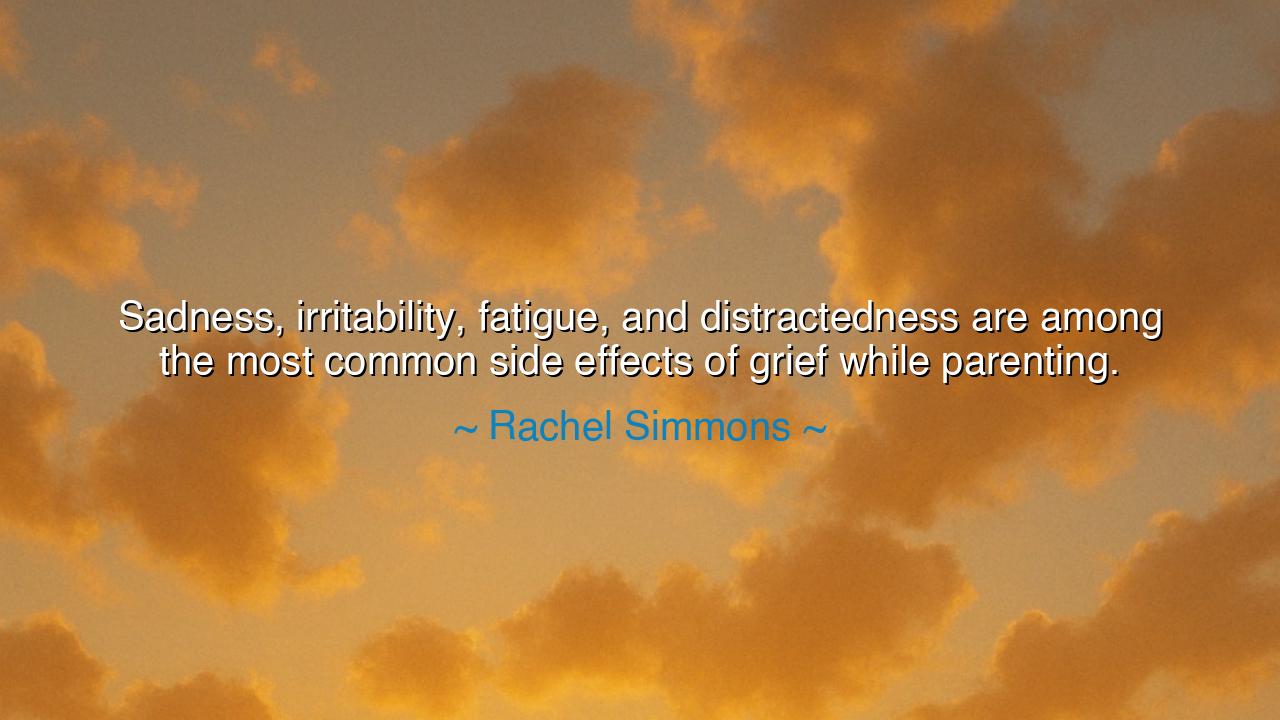
Sadness, irritability, fatigue, and distractedness are among the
Sadness, irritability, fatigue, and distractedness are among the most common side effects of grief while parenting.






Hearken, O children of generations yet to awaken, and attend to the solemn wisdom of Rachel Simmons, who speaks with clarity upon the trials of the human heart: “Sadness, irritability, fatigue, and distractedness are among the most common side effects of grief while parenting.” In these words lies a truth as old as parenthood itself: that sorrow and loss do not pause for duty, that grief entwines itself with responsibility, and that the labor of raising children continues even amidst the storm of the soul. Parenting, even in its joy, carries the weight of vulnerability, and grief magnifies the fragility of spirit.
The origin of this reflection rests in Simmons’ study of families and the emotional landscapes of parenthood, particularly under conditions of loss and mourning. She observes that grief manifests not only in isolation, but within the daily responsibilities of caring for the young. Parents, bound by love and duty, often continue their tasks even while sorrow, fatigue, and distraction permeate their hearts, revealing the profound intersection of emotion and responsibility, and the courage demanded by the role of nurturer amidst personal suffering.
The meaning of her words is both practical and moral. To grieve while parenting is to endure a paradox: the heart is heavy, yet the child’s needs remain, insistent and unrelenting. Sadness may cloud judgment, irritability may flare unbidden, fatigue may dull vigilance, and distractedness may threaten attentiveness. Yet in recognizing these as common side effects, Simmons offers solace and understanding: grief is not weakness, nor failure, but a natural response that must be acknowledged, managed, and borne with compassion for oneself.
Consider the life of Abraham Lincoln, who bore profound sorrow while raising his family during the trials of the presidency. The loss of his sons, combined with national grief, tested his spirit and patience. Yet he continued to guide, protect, and nurture, modeling resilience in the face of heartache. His experience illustrates Simmons’ truth: grief does not excuse neglect, but it transforms the labor of parenting into an act of profound courage and endurance, demanding both self-awareness and compassion.
Simmons’ reflection also carries a subtle warning: the intersection of grief and parenting can erode patience, understanding, and emotional presence if left unacknowledged. Parents must recognize that sadness, irritability, fatigue, and distraction are signals for care—care for the self as well as for the child. Awareness allows one to seek support, communicate needs, and approach duties with intentionality, ensuring that grief does not unknowingly diminish the quality of nurturing or the safety and growth of the young.
The lesson for future generations is luminous: grief is a natural companion of life, yet its burdens can be managed with mindfulness, support, and reflection. Accept your emotions, share your struggles, and seek counsel or assistance when needed. By acknowledging the weight of sorrow, the parent honors both the reality of human experience and the needs of the child, cultivating resilience, empathy, and authenticity in the household.
In practical life, one may follow Simmons’ counsel by creating structures of support, self-care, and intentional presence. Rest when weary, communicate openly, and allow oneself grace amid imperfection. Engage with children in ways that honor both your grief and their needs, seeking moments of connection even amidst fatigue. By doing so, the parent nurtures both the child and the self, modeling endurance, emotional honesty, and the sacred balance between duty and humanity.
Thus, O children of future ages, carry this teaching as both lantern and shield: grief and parenting coexist, and the recognition of its effects is a pathway to wisdom and resilience. Attend to your heart, acknowledge your struggles, and approach your children with both patience and authenticity. In this practice lies the enduring legacy of courage, love, and understanding, illuminating the path for generations yet to inherit the mantle of care and the weight of human emotion.






AAdministratorAdministrator
Welcome, honored guests. Please leave a comment, we will respond soon